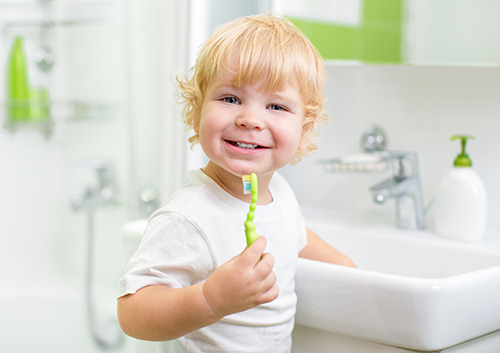Getting Ready for Winter
November 2nd, 2022

Winter Is Coming.
Okay, that sounded a lot more dramatic in a popular fantasy series. But here in the real world, winter is coming as well, so let’s look at some easy steps you can take to keep your teeth and gums healthy during this icy season.
Remember to Hydrate
Dehydration is dangerous for your health in general, and it’s also bad for your dental health. A dry mouth is more vulnerable to gum disease and tooth decay because there’s less saliva to help maintain a healthy oral environment. Saliva helps wash away food particles and bacteria, works to neutralize the cavity-causing acids they produce, and strengthens tooth enamel with its mineral content.
Summer means heat and perspiration—two obvious causes of dehydration. Winter, though, has its own more subtle ways to dry you out.
- Just as you lose moisture through summer perspiration, you lose moisture with a winter workout as well. That foggy cloud you see when you exhale outdoors? That’s water vapor leaving your body.
- Cold weather means it’s time to kick up the heating system a few degrees. But unlike heated summer outdoor air, heated winter indoor air is not as humid, so it’s more drying.
- Some of us just aren’t as thirsty during winter months, and so we don’t hydrate as regularly as we do in the summer. And while summer menus tend to offer foods like salad, fruits, and iced drinks which automatically provide us with a lot of water content, winter menus? Not so much. Keep up with your daily recommended amount of water throughout the year for a healthier body and healthier teeth and gums.
Wear Your Mouthguard
Whether it’s skiing, hockey, snowboarding, or skating, those winter sports can be hard on your teeth. That’s why it’s important to wear your mouthguard when you’re getting the most out of the snow and ice. Mouthguards help prevent injuries to your teeth and provide protection for your jaw and mouth, too.
And a sport doesn’t have to involve snow and ice to be a winter hazard for your teeth. The combination of hard courts, flying elbows, and body contact make basketball a leader in the dental injuries competition. In fact, any sport which involves potential falls or personal contact is a good candidate for a mouthguard.
Mouthguards are available in several forms:
- One-size-fits-all, pre-formed mouthguards can be found in drugstores and sporting goods stores.
- “Boil-and-bite” models are warmed in hot water and then shaped when you bite down. The fit is somewhat more comfortable than a stock guard.
- Custom-made guards from your dentist are precisely molded to your teeth and mouth, letting you speak and breathe more comfortably.
If you haven’t gotten a mouthguard yet, or your old high school guard was retired years ago, talk to Drs. Angela Paros, Amer Atassi, Eric Young, Alexander Katsnelson about a custom guard. While the over-the-counter options are better than going unprotected, a custom mouthguard fits your teeth perfectly—and comfortably!
Get to the Bottom of Winter Sensitivity
That first breath of frosty air might be more alarming than invigorating when tooth pain and sensitivity makes being out in the cold an unpleasant experience. Sensitivity to cold air or warm winter drinks can be an important symptom, caused by a number of dental conditions such as:
- Cracked teeth
- Cavities
- Exposed dentin (the layer of the tooth underneath your enamel)
- Receding gums
- Over-vigorous brushing
If the cold weather is keeping you indoors because of oral sensitivity, give us a call.
Even though this can be a very busy time of year, if you’re due for a checkup and cleaning at our Romeoville, IL office, or if you have any concerns about your teeth and gums, make time for your dental health. We want to make sure you’re ready to enjoy every frosty moment of the season!
What kind of toothbrush and toothpaste should my child use?
October 26th, 2022

Drs. Angela Paros, Amer Atassi, Eric Young, Alexander Katsnelson and our team know that as a parent, you want your child to be as healthy as possible. By now, you probably know that your son or daughter’s oral health plays a huge role in overall health.
When there are so many toothpaste ads and different styles of brush to choose from, it can be difficult to know which will serve your child the best. We recommend you break down the decision process to make it simpler.
First, your child’s age and stage of development are vital to consider. Until about the age or 12, your youngster may not be prepared to brush or floss adequately alone, due to dexterity issues. If that’s the case, it can be easier to use a battery-powered toothbrush to improve the quality of brushing.
Next is to select the right size of toothbrush head to fit your child’s mouth. As a general rule, the head of the toothbrush should be a little larger than the upper portion of the child’s thumb.
Flossers are great for children and easy to use. They have handles and a horseshoe shape on one end with floss in between. Your child can choose a color he or she likes as well as the handle size, shape, etc.
Not only are there many brands of toothpaste to choose from, there are also many different ingredients that offer varying benefits. Kids are at high risk for developing cavities so you want to make sure the following ingredients are in your child’s toothpaste if you wish to avoid problems later on.
Sodium fluoride is the standard ingredient for cavity prevention, while stannous fluoride is anti-bacterial and anti-cavity. Anti-sensitivity toothpastes often contain potassium nitrate, and triclosan can be found in one particular brand for anti-bacterial action.
Fluoride should not be ingested, so if your child can’t spit yet, use a toothpaste that contains xylitol. This is a natural sweetener and should be the first ingredient listed on the tube.
Now comes the fun part: choosing a flavor! Your little one may sample different flavors and select the one he or she likes the best. A youngster is more likely to adopt good brushing habits if the flavor is appealing.
Don’t hesitate to speak with Drs. Angela Paros, Amer Atassi, Eric Young, Alexander Katsnelson if you need to make an appointment at our Romeoville, IL office, or if you have any questions about toothpastes or toothbrushes.
Breaking Bad Oral Habits
October 19th, 2022

The effects of bad oral habits are something our team sees all too often. You might have bad oral habits that stem from childhood, possibly because your parents did not know about proper oral care or force you to follow it. Or, your bad habits could develop gradually, like slacking on your frequency of brushing.
Bad oral habits can lead to tooth decay, gum disease, and consequences such as losing teeth and experiencing bad pain. They may be deeply ingrained and easy to continue, but you can break them with a little effort. Focus on developing good habits to replace your current ones, and eating a diet that is healthy for your teeth.
Replace Bad Habits with Good
Breaking your bad oral habits may not be as difficult as you expect when you focus instead on developing good habits. These new good habits can naturally replace your bad habits.
- Brush your teeth after each meal or at least twice a day.
- Visit a dentist every six months for an exam and a professional cleaning.
- Floss your teeth every day.
These good habits may not seem natural, so you can take steps to make sure you follow these behaviors. For example, make a daily checklist with your scheduled sessions of brushing and flossing your teeth and using mouthwash. You can also set a timer to be sure you brush your teeth for the full recommended two minutes.
Eat Properly
Poor eating habits can be detrimental to your teeth. A common mistake is to let food, especially carbohydrates such as starch and sugar, stay on your teeth for a long time. You can stop doing this by rinsing your mouth with water after each meal or snack. Also, avoid candy and soft drinks between meals, since the sugar sits on your teeth.
A healthy diet provides the nutrients you need to maintain strong teeth. The mineral calcium is key for healthy teeth, so try to get your three daily servings of high-calcium foods, such as low-fat milk or yogurt, canned fish, or fortified soy or almond milk. Also include vegetables and fruits, which have a high water content.
If you need more tips about breaking your bad oral health habits, contact our Romeoville, IL office and speak with Drs. Angela Paros, Amer Atassi, Eric Young, Alexander Katsnelson or a member of our team.
Periodontal Health During Pregnancy
October 12th, 2022

If you are expecting, it is critical to maintain a healthy lifestyle to ensure both your health and the health of your little one. This includes maintaining your regimen of brushing twice per day and flossing. It also includes regular visits to our Romeoville, IL office, as recommended by the American Academy of Periodontology (AAP), who suggest that women who are pregnant or considering pregnancy undergo a periodontal evaluation.
Women who are pregnant are particularly susceptible to gingivitis, a mild form of periodontal disease that is characterized by reddening, swelling, and bleeding of the gums. It is a condition that is not to be overlooked and can be treated and reversed by Drs. Angela Paros, Amer Atassi, Eric Young, Alexander Katsnelson.
Research at the University of North Carolina has indicated a connection between periodontal disease and an increased risk of low birth weight, a serious issue that affects roughly one in ten babies born in the United States. Low birth-weight babies may be at risk to have respiratory, intestinal, and heart issues. They also face long-term health problems such as vision and hearing loss, delayed motor skills, and potential learning disabilities, according to the Center for Disease Control and Prevention.
Besides the possibility of leading to low birth weight of your baby, gingivitis, if left undetected and untreated, can also lead to periodontitis, a much more serious gum disease that attacks the gum tissue and the bone supporting the teeth. Periodontal diseases can lead to tooth loss and are associated with other serious conditions such as diabetes and cardiovascular disease.
Maintaining periodontal health is an important part of a healthy pregnancy. Seeking timely treatment for gum disease is important not just for your personal health, but also for the health of your baby. Early diagnosis of periodontal disease can give you peace of mind that both you and your baby will be healthy. To learn more about preventing gum disease, or to schedule your periodontal evaluation or cleaning at High Point Dental Group, please give us a call today!






